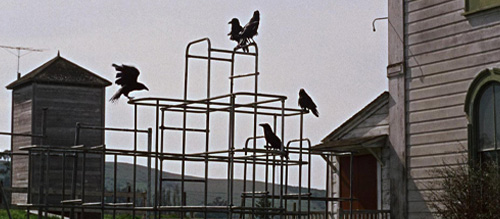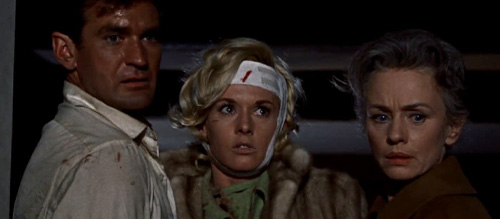‘The Birds’ at 60 – Review

The Birds (1963)
Director: Alfred Hitchcock
Screenwriter: Evan Hunter
Starring: Tippi Hedren, Rod Taylor, Jessica Tandy, Suzanne Pleshette, Veronica Cartwright, Ethel Griffies, Charles McGraw, Ruth McDevitt, Lonny Chapman
Memorably, in Back to the Future Part II, after a holographic advert for “Jaws 19” jumps out of a billboard at Marty McFly, he wryly quips “shark still looks fake!”. One of the most recurrent questions since so-called natural horror or creature feature films started being a thing in the mid-20th century has always been… does this matter? 60 years ago, hot on the heels of his smash-hit success Psycho, the Master of Suspense unleashed another unexpected horror upon the world, but how well does The Birds hold up to modern scrutiny?
Melanie Daniels’ (Tippi Hedren) spontaneous trip to a peaceful coastal town to come out on the right side of a practical joke instigated by charming lawyer Mitch Brenner (Rod Taylor) takes a far more life-threatening turn when the local residents are mysteriously attacked by the entire local population of birds. Inspired in equal parts by the Daphne du Maurier short story of the same title and a strange real-life incident involving sudden unprovoked seabird attacks from a few years before the film’s release, The Birds wisely avoids the temptation to provide a definitive explanation for what is going on and lets its unforgettable imagery speak for itself.
The no-nonsense opening titles with bird silhouettes flying past the camera accompanied by a cacophony of noise prepares you for the two main aspects of filmmaking that the film revolutionised: the sound and the special effects designs. The proto-electronic instrument, the Mixtur-Trautonium, brought an uncanny eeriness to the shrieks of birds and created an all-encompassing soundscape that made a traditional score surplus to requirements, often coming across as far scarier than anything we are actually shown.
Harmless caged domestic birds are contrasted with the birds acting threateningly in the skies outside early in the film, emphasising the power of the natural world that we humans can only fleetingly keep in check.
The bird attack scenes in which hundreds of birds appear to be flying around and pecking panicking people were created by Disney’s Ub Iwerks using the same sodium vapor “yellowscreen” process extensively utilised for more magical purposes in Mary Poppins (1964). Two separately filmed elements are exposed using a beam-splitter and the narrow colour spectrum allows for both layers to appear untarnished and relatively convincing by standards of the time. This is admittedly less the case when we pull out for a wide shot of the chaos in broad daylight, and the illusion still had to be completed with a combination of real birds on set and a menagerie of models and puppets.
This being Tippi Hedren’s screen debut really shows. She wears the hell out of a mint green suit and has an entertaining passive-aggressive flirtation with Rod Taylor, but her range beyond acting scared was limited at this stage in her career. She would go on to do much more interesting work in her next collaboration with Hitchcock, in psychological thriller Marnie, but she also stands in for many of the director’s unforgivably mistreated blonde leading ladies.

Jessica Tandy easily acts everyone else off the screen, giving her widow steely resilience and a painful history. The characters are for the most part a bit of a let-down, only working in the broadest of strokes, and that’s after Hitch asked his screenwriter, novelist Evan Hunter, for rewrites. Everyone gets just one unique character trait and 11-year-old Cathy (Veronica Cartwright) is hilariously made to sound like a hippie student (“Aw mom, I know all that democracy jazz!”).
The more potentially interesting moments of characterisation are likely unintended and only show up when viewing the film through specific critical frameworks, like the fact that no matter what feelings she voices regarding Mitch there is a bit of a flirtatious lesbian atmosphere between Melanie and schoolteacher Annie (Suzanne Pleshette).
Sooner or later this kind of movie needs an expert to come in and explain it all and that role falls to local ornithologist Mrs Bundy (Ethel Griffies): “Birds have been on this planet since archaeopteryx, 140 million years ago. Doesn’t it seem odd that they’d wait all that time to start a war against humanity?”. Ultimately she’s not a lot of help to the group, but she has a valiant attempt at rationalising the chaos whilst gesturing with her cigarette for effect.
The Birds was made in an era when (at least in a film) everyone left their doors unlocked and a stranger could ask in a corner shop for someone’s exact address or a teacher for a child’s name and for some reason nobody would call the police. Having said this, Hitchcock famously dismissed any such logical criticisms of his plots or why his film’s characters don’t do things that most of us would, commenting “because it’s dull”.
There’s a long build with not a lot happening in this film before all feathery hell breaks loose at the halfway point. A series of tense set pieces with the survivors running from cover to cover and trying to fortify their positions against attacks may well have influenced the standard structure of the zombie movies that would become horror’s most popular sub-genre in the following decades. Like even the early Dead films, The Birds is fairly bloody and brutal for a film of the time, with the bird attacks and their aftermath resulting in pecked up and mutilated bodies and no small amount of trauma for the those lucky enough to come away with everything intact. Any hope of a happy ending is also left fairly ambiguous at Hitch’s request.
The Birds has a lot going for it, with Hitchcock’s effortless mastery of maintaining suspense and pacing the story for maximum impact. The screenplay is serviceable enough, but the characters are paper-thin and your overall enjoyment might largely depend on your response to special effects that look more striking than 100% convincing, though never as terrible as shonky reimaginings like Birdemic might have you believe.
Score: 17/24

